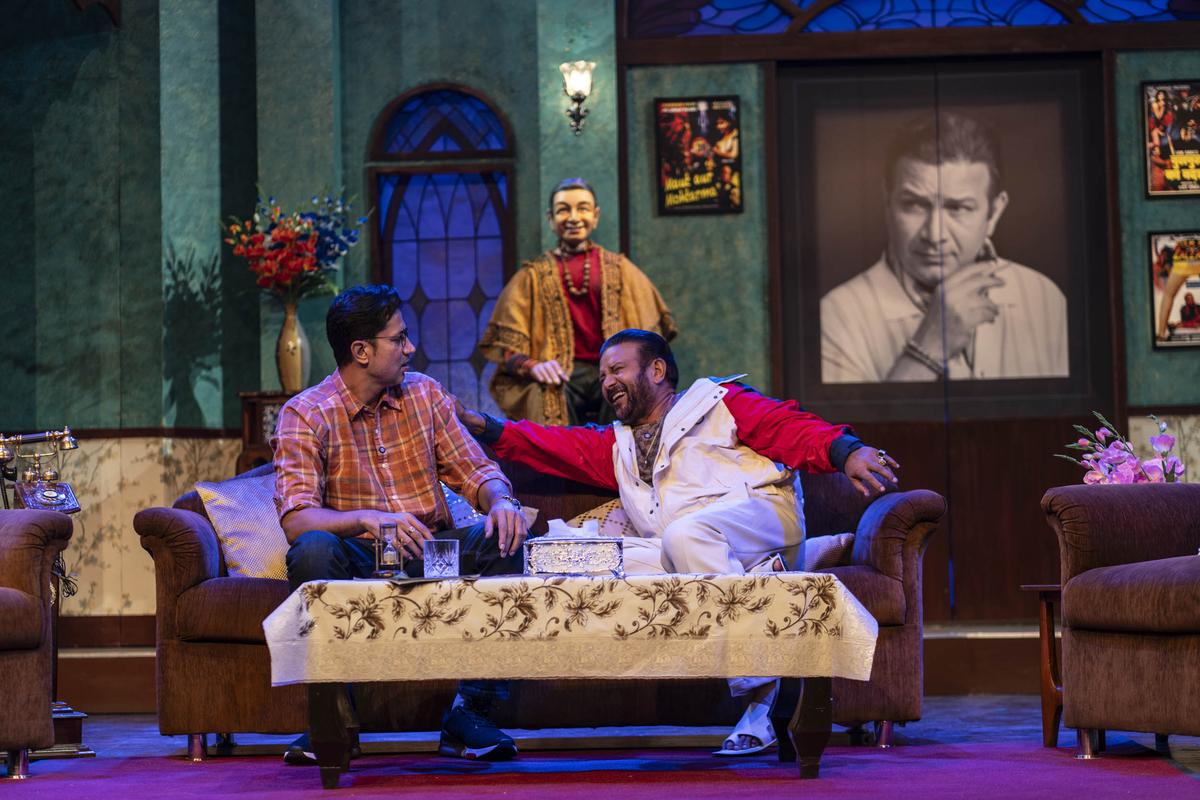“Theatre is like my comfort food, dal chawal, something I want to return to as often as I can.” Kumud Mishra is conscious of the similes he uses to describe his first love. “Theatre offers me challenges that I get only once in five years in films.”
The latest is Saanp Seedhi, a thriller in the guise of a love triangle where Kumud plays a showman, vastly different from his understated turns on screen. Staged as part of Aadyam Theatre’s bouquet of plays this year in Mumbai and Delhi, Saanp Seedhi is a desi adaptation of Anthony Shaffer’s popular two-character play Sleuth.
Written in 1970, Akarsh Khurana has adapted Sleuth, and director Shubhrajyoti Barat generates thrills and along the way tells us that Saanp Seedi is more than a board game — it teaches us the cost of sins and the value of virtuous deeds.
Kumud plays Anil Wadhwa, an ageing actor-director-producer of crime thrillers who cooks up a plot in his personal space by inviting the young lover of his wife (played by Sumit Vyas) home. What starts as a unique, friendly chat leads to a twisted clash of egos that turns sinister.
“There is a lot of scope for performance in Sleuth. Over the years, some of the top actors have played the part. I didn’t watch any of the performances or cinematic adaptations available on the Internet.Now, I might catch up. Every actor thinks that after playing a big part, he will become big. It doesn’t happen that way, though,” Kumud remains pragmatic like some of his popular on-screen characters.
While many of his contemporaries at the National School of Drama have no time for the stage, Kumud says that if you have the desire and intent, time cannot become a handicap. “My training in theatre helped me perform better in mainstream films. And, my experience in cinema helped me internalise the characters better. With technology making its way into theatre, you don’t have to take the effort to be heard till the last row.”

From Saanp Seedhi, a desi adaptation of Anthony Shaffer’s popular two-character play Sleuth
| Photo Credit:
Neville Sukhia
Quoting Naseeruddin Shah, Kumud says the thespian told him that the character’s contours are there in a good script. “We just have to find them.” He credits directors such as Anubhav Sinha, Nitin Kakkar and Vijay Krishna Acharya with tapping his potential. For example, in My Great Indian Family, Kumud plays a priest who is secular, and he says Vijay helped him explore the character’s internal conflict.
Recently, Kumud’s friend was not permitted to stage a play on Hitler set in Nazi Germany. “Art is a medium of protest, but in the current atmosphere, when two people can threaten you and three can burn the venue, showcasing your art has become a risk. It leaves us vulnerable. In cinema, the stakes are higher. Theatre still finds a way. We are asked whether our play is political, religious, satirical…with so many ifs and buts, one has to camouflage the thought to find a stage.”
There was a time, remembers Kumud, when he played Aurangzeb in a school production on Sambhaji and Alamgir. “I was 16, and my Marathi drama teacher inspired me to bring out the human side of him. In those days, we didn’t see things in black-and-white. Of course, Aurangzeb was cruel, even to his family. But why can’t we see him as a ruler, an individual? Why do we use his name to cast aspersions on an entire community?”
A student of history, Kumud doesn’t buy the argument that history books are not fair in representing the past. “I was very much aware of the Vijayanagar Empire, the Cholas and the Cheras, and have visited Hampi several times. We have to make people socially and politically aware and wait for society to get bored of hate-filled narratives.”
Hailing from a deeply religious family in Rewa, Madhya Pradesh, Kumud’s father was in the Army and was passionate about acting on stage. “My sister’s best friend was from another religion. My grandfather and father had no issue with it, but my mother didn’t find it right. But she couldn’t find any justification for her disapproval. These days, WhatsApp offers us that justification through a false narrative. We cannot depend on social media narratives to know each other,and express surprise by saying aap waise wale musalman nahin hai (you are not like that Muslim) when we cross others’ paths.”
Published – April 02, 2025 06:23 pm IST

